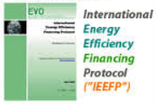
For the first time, ICP’s Energy Performance Protocols were used to leverage financing for a $2 million office building retrofit in Bridgeport, Connecticut. This new model could accelerate the vast potential of energy efficiency retrofits in commercial buildings.
ICP’s protocols have been developed with broad stakeholder participation including engineers, industry allies, financial market participants, insurers, regulators and utilities. The protocols aim to significantly increase stakeholder confidence in project performance and savings. Widespread market adoption of the ICP protocols will help to lower capital costs and increase the availability of funding, allowing large-scale investment to flow into commercial energy efficiency projects.
The use of ICP protocols in the Connecticut building upgrade demonstrates that their initial market adoption is underway. The project received support from a number of influential ICP allies, including Sustainable Real Estate Solutions, Inc. (SRS), EMCOR Services New England Mechanical (EMCOR) and Connecticut’s Clean Energy Finance and Investment Authority (CEFIA) the administrator of Connecticut’s Commercial Pace Program (C-PACE).
SRS, a member of ICP’s Ally Network, has embedded ICP protocols within its energy retrofit underwriting software platform. The use of this platform enabled the Connecticut building developer, EMCOR, to design the retrofit to be consistent with both Connecticut’s C-PACE standards and the recently-released ICP protocols. As a result, the investor, CEFIA, and the building owner had the data they needed to meet their investment underwriting requirements, thus green lighting the project.
The importance of sound technical underwriting to drive investor confidence is clear demonstrated in the by comments from Genevieve Sherman, Senior Manager of CEFIA’s C-PACE program stated, “CEFIA welcomes EDF’s ICP that builds on the project underwriting foundation created in the Connecticut C-PACE program, which is specifically designed to address the owner and investor confidence challenge, perhaps the key impediment to energy retrofit financing nationwide.” She added, “ICP furthers our goal of helping make energy efficiency and clean energy financing a mainstream financial asset class with a high degree of standardization, predictability, and scale.”
The ultimate goal for the Investor Confidence Project is to transform the current energy efficiency marketplace, making it more robust and dynamic. As this project helps demonstrate, the ICP protocols are already increasing the confidence of building owners and lenders in real-world projects.
Read Press Release


 RSS Feed
RSS Feed